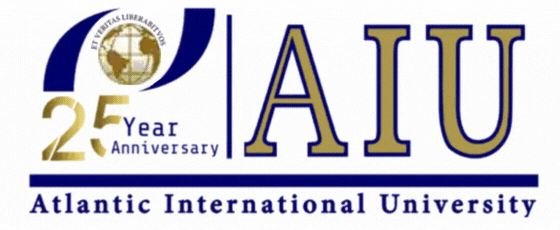- RESEARCHDistance Learning at AIU is enhanced by vast academic resources and innovative technologies build into the Virtual Campus: Hundreds of self-paced courses with video lectures and step by step lessons, thousands of optional assignments, 140,000 e-books, the Social Media & Networking platform allowing collaboration/chat/communications between students, and MYAIU develop students holistically in 11 areas beyond just academics.
- PROGRAMS OFFERED
- Areas of Study
- Courses and Curriculum
- Open Courses
- Register for a Program
- Associate Program
- Associate in Addiction Counseling
- Associate in Agriculture Food And Resources
- Associate in Anti Terrorism Security
- Associate in Behavior Analysis In Special Education
- Associate in Bioethics
- Associate in Climatology
- Associate in Cultural Theological Communication
- Associate in Culinary Arts
- Associate in Ecotechnology
- View all Associates Programs
- Bachelor Program
- Bachelors in Community Development
- Bachelors in Environmental Science
- Bachelor in Education (B.Ed, BS)
- Bachelors in Economics
- Bachelors in Entrepreneurship
- Bachelors in Financial Administration
- Bachelors in Human Resource Management
- Bachelors in Linguistics
- Bachelors in Nutritional Science
- Bachelors in Occupational Health and Safety
- Bachelors in Psychology
- View all Bachelor Programs
- Doctorate Program
- Doctor | of Biology (PhD)
- Doctorate in Business Administration (DBA, PhD)
- Doctor of Economics (PhD)
- Doctor of Electrical Engineering (D.Sc, PhD)
- Doctor of Finance (PhD)
- Doctorate in International Relations
- Doctorate in Information Technology (D.Sc)
- Doctor of Legal Studies (PhD)
- Doctor of Project Management (PhD)
- Doctor of Sociology (PhD, D.Sc)
- Doctorate in Sustainable Natural Resources Management
- View all Doctorate Programs
- Master Program
- Postdoctoral Program
- Postdoctoral in Animal Science
- Postdoctoral in Anti Terrorism Security
- Postdoctoral in Behavior Analysis In Special Education
- Postdoctoral in Bioethics
- Postdoctoral in Blockchain Technology and Digital Currency
- Postdoctoral in Business Management
- Postdoctoral in Cloud Computing
- Postdoctoral in Computer Engineering
- View all Postdoctoral Programs
AIU offers a wide range of majors in areas including the Arts, Business, Science, Technology, Social, and Human studies. More than 120 degrees and programs are available for adult learners at the associate’s, bachelor’s, master’s, doctoral and postdoctoral level. - VIRTUAL CAMPUS
Distance Learning at AIU is enhanced by vast academic resources and innovative technologies build into the Virtual Campus: Hundreds of self-paced courses with video lectures and step by step lessons, thousands of optional assignments, 140,000 e-books, the Social Media & Networking platform allowing collaboration/chat/communications between students, and MYAIU develop students holistically in 11 areas beyond just academics.
- ALUMNI
The world is YOUR campus!”, that is the message of AIU’s month magazine Campus Mundi. Hear the voices and see the faces that make up AIU. Campus Mundi brings the world of AIU to you every months with inspirational stories, news and achievements by AIU members from around the world (students and staff are located in over 200 countries).
Comparative Public Policy and Security
Navigating Security: The Impact of Cultural and Political Contexts on Public Policy
This document examines how cultural and political contexts shape public security policies. It highlights the importance of community trust, technological advancements, and ethical considerations in developing effective crime prevention strategies. The study emphasizes the need for adaptive policies that respect societal values while addressing emerging security challenges like cybercrime and terrorism.

The document explores the intricate relationship between cultural and political contexts and their influence on public security policies across different nations. It emphasizes that security strategies are not one-size-fits-all; rather, they must be tailored to the unique cultural values, social norms, and political environments of each society to be effective.
The paper begins by discussing the significance of community-based policing models, which are particularly effective in societies where trust and social cohesion are integral. It references the work of Bayley and Shearing, who argue that culturally sensitive security policies are more likely to gain public acceptance and cooperation. For instance, Japan’s community policing model, exemplified by the kōban station system, fosters collaboration and aligns with local cultural norms, encouraging citizen participation in maintaining public order. In contrast, the enforcement-focused model prevalent in the United States reflects different societal values and expectations, highlighting the need for cultural adaptability in security policy.
The document further examines the impact of cultural context on public expectations and collective attitudes toward law enforcement. It notes that security policies deeply rooted in the cultural fabric of a society can lead to higher levels of public trust and cooperation. The effectiveness of these policies is contingent upon their alignment with societal values, as demonstrated by the contrasting approaches of various countries.
Additionally, the paper addresses the role of transparency and trust in government as critical factors influencing public acceptance of security measures. It discusses the ongoing evolution of public security policies in response to technological advancements and shifting cultural attitudes, particularly in the face of emerging global security threats such as cybercrime and terrorism. The need for international cooperation and the sharing of best practices is emphasized to maintain security while respecting human rights.
In conclusion, the study highlights the complexity of designing effective security strategies that respond to both immediate threats and long-term societal needs. It underscores the importance of integrating technological innovations with ethical considerations, particularly regarding privacy and civil liberties. The comparison of different political systems further illustrates how social, political, and cultural contexts shape public security policies, ultimately advocating for adaptive, culturally sensitive, and ethically sound approaches to enhance public safety.
Atlantic International University
Get to know the AIU experience
Contact Us Today!
We understand how busy adults do not have time to go back to school. Now, it’s possible to earn your degree in the comfort of your own home and still have time for yourself and your family. The Admissions office is here to help you, for additional information or to see if you qualify for admissions please contact us. If you are ready to apply please submit your Online Application and paste your resume and any additional comments/questions in the area provided.
Pioneer Plaza
900 Fort Street Mall 905
Honolulu, HI 96813
800-993-0066 (Toll Free in US)
808-924-9567 (Internationally)
808-947-2488 (Fax)
AIU Success Stories







Contact Us Today!
Begin Your Journey!
AIU’s Summer of Innovation and Growth gives you the ability to earn up to $5000 in tuition credit by completing free lessons and courses.
Whether you’re looking to acquire new skills, advance your career, or simply explore new interests, AIU is your gateway to a world of opportunities. With free access to 3400 lessons and hundreds of courses the ability to earn credits and earn certificates there’s no better time to start learning.
Join us today as a Guest Student and take the first step towards a brighter, more empowered future.
Explore. Learn. Achieve.
Degrees

Contact Us
Atlantic International University
900 Fort Street Mall 905 Honolulu, HI 96813 [email protected]
Quick Links
Home | Online Courses | Available Courses | Virtual Campus | Career Center | Available Positions | Ask Career Coach | The Job Interview | Resume Writing | Accreditation | Areas of Study | Bachelor Degree Programs | Masters Degree Programs | Doctoral Degree Programs | Course & Curriculum | Human Rights | Online Library | Representations | Student Publication | Sponsors | General Information | Mission & Vision | School of Business and Economics | School of Science and Engineering | School of Social and Human Studies | Media Center | Admission Requirements | Apply Online | Tuition | Faculty & Staff | Distance Learning Overview | Student Testimonials | AIU Blogs | Register for Program | Privacy Policy | FAQ



















